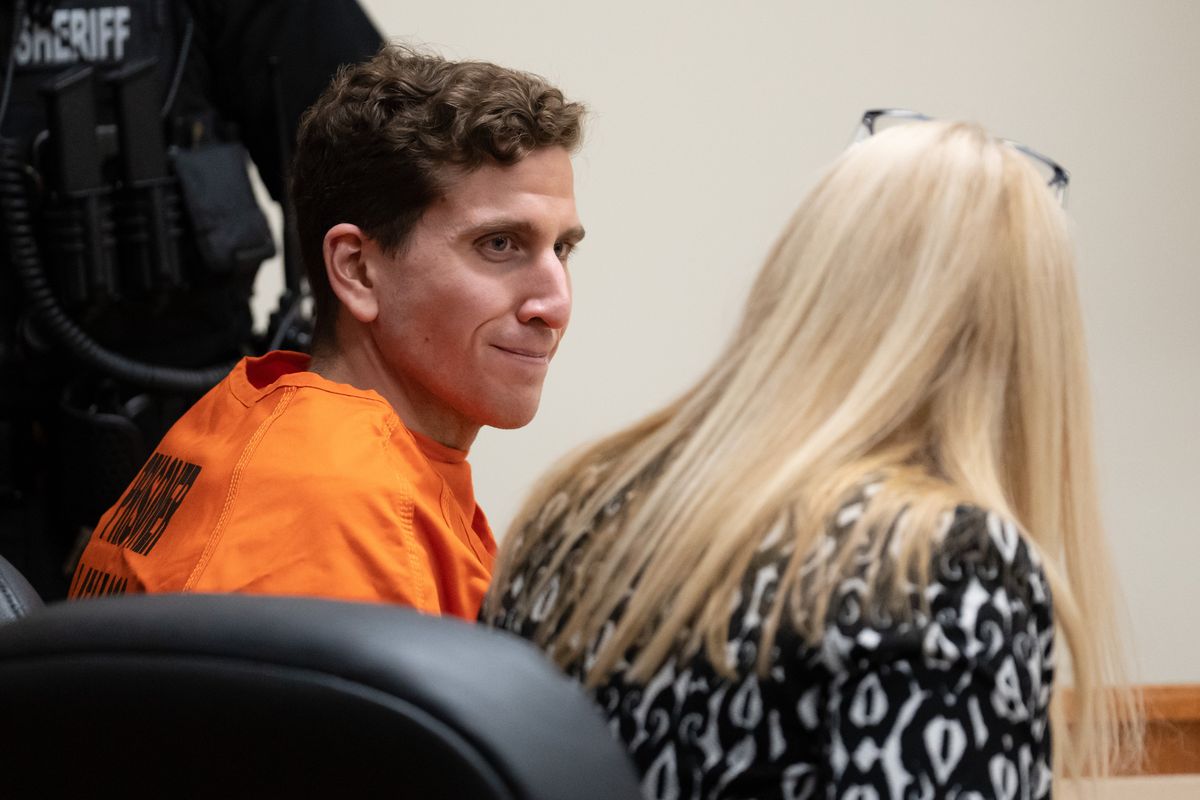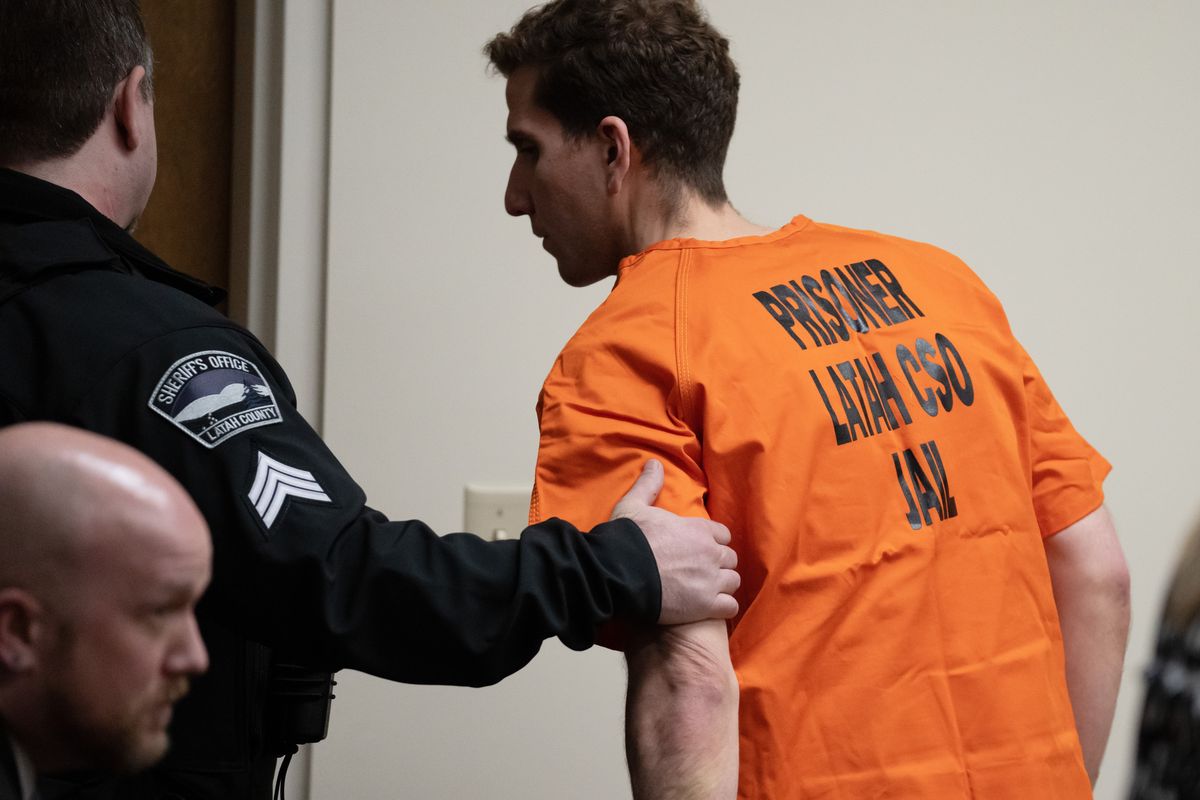Investigators believe DNA of accused killer found on sheath at home where 4 UI students were slain
Bryan Kohberger, left, who is accused of killing four University of Idaho students in November, looks toward his attorney, Public Defender Anne Taylor during a hearing Thursday in Latah County District Court. (Ted S. Warren/Associated Press, Pool)
MOSCOW, Idaho – Investigators found DNA they believe belongs to the man accused of stabbing four University of Idaho students to death at the home where the killings took place.
DNA was found on the snap button of a tan leather knife sheath left on the bed where the bodies of Madison Mogen and Kaylee Goncalves were discovered, according to partially redacted court records released Thursday morning. Police believe the genetic material links Washington State University criminal justice graduate student Bryan Kohberger, 28, to the killings based on another DNA sample obtained from his family’s trash in Pennsylvania on Dec. 27.
Dozens of Pennsylvania police in tactical gear broke windows and broke down doors to enter the family home early Dec. 30 to arrest Kohberger. The DNA found in the Kohbergers’ trash matches with more than a 99.99% likelihood to be the father of the person whose DNA was found on the knife sheath, according to court records.
Homicide detectives also released details of how one of the surviving roommates saw the killer in the immediate aftermath of the Nov. 13 attacks along with detailed tracking of Kohberger’s cellphone and extensive security video of a car investigators believe is his.
Kohberger appeared in Latah County District Court for the first time Thursday morning. He arrived at the Pullman-Moscow Regional Airport after a cross-country extradition flight from Pennsylvania Wednesday evening. Kohberger is jailed without bond pending a Jan. 12 court hearing.
Kohberger, wearing orange Latah County Jail clothing, walked into the packed courtroom and did not look at the roughly 60 people filling the five long benches in the room. The first row was reserved for the victims’ families, where the Goncalves family sat during the hearing. Media members crammed into the remaining rows.
Latah County Magistrate Judge Megan Marshall advised Kohberger of his rights, such as his right to remain silent and the prosecutors’ requirement to prove the case beyond a reasonable doubt to convict Kohberger.
Marshall asked whether Kohberger understood his rights. He replied, “Yes.”
Kohberger appeared calm and did not display emotion throughout Thursday’s hearing. He is charged with with four counts of first-degree murder and one count of burglary. If convicted, he faces life in prison or potentially the death penalty.
UI seniors Mogen, 21, of Coeur d’Alene; Goncalves, 21, of Rathdrum; junior Xana Kernodle, 20, of Post Falls; and freshman Ethan Chapin, 20, of Mount Vernon, Washington, were stabbed to death Nov. 13 at a rental home just off the UI campus in Moscow. The three female victims lived in the rental house with two other women who police said were unharmed and not involved in the crime.
In the first detailed narrative of what happened at 1122 N. King Road in Moscow, homicide detectives noted that a surviving roommate told investigators she awoke around 4 a.m. and heard noises that sounded like Goncalves playing with her dog upstairs. Soon after, she heard one of her roommates say something like, “there’s someone here.”
She looked out of her bedroom, which is on the second floor along with Kernodle’s, and didn’t see anything, according to court records. When she heard what she thought was crying, she opened her bedroom door and checked a second time.
She heard a man say: “It’s OK, I’m going to help you.”
She closed her door again, but decided to open it a third time when she heard more crying. That’s when she saw a man wearing black clothing and a mask covering his mouth and nose. The man, whom she described as 5-foot-10 or taller, “not very muscular” but with an athletic build and bushy eyebrows, walked past her as she stood in a “frozen shock phase,” according to the court document.
The man then walked toward a sliding glass door on the second floor of the three-story rental home as she went into her bedroom and locked the door.
A security camera less than 50 feet from the rental home picked up “distorted audio of what sounded like voices or a whimper followed by a loud thud” at 4:17 a.m., according to court records. A dog could be heard barking at the same time.
Court records don’t disclose whether there are any links between Kohberger and the victims or surviving roommates. The sheath found in the home was for a KA-BAR knife with a United States Marine Corps seal. Investigators had not located the knife used in the attack as of earlier this month.
Court documents suggest Kohberger’s name first came to the attention of detectives as a possible suspect on Nov. 29.
Investigators combed through hours of security video from multiple cameras and concluded that the killer likely had been driving a white Hyundai Elantra manufactured between 2011 and 2016, based on an FBI expert’s viewing of the camera footage.
They shared that information with other law enforcement, and that’s when WSU Police Officer Daniel Tiengo ran a check for white Elantras registered at WSU. He found a 2015 Elantra registered to Kohberger.
Another WSU officer, Curtis Whitman, found the Elantra that day parked near Kohberger’s apartment. He ran the plates and provided the information to detectives investigating the UI killings.
Moscow Police Cpl. Brett Payne, who wrote the documents released Thursday, said Kohberger’s driver’s license photo showed a man with bushy eyebrows and appeared to match the description of the killer provided by the roommate.
The Elantra was recorded numerous times on security cameras in the neighborhood where the killings occurred from 3:29 a.m. to 4:20 a.m. on the morning of the attacks, according to court documents. The last time the Elantra was recorded in the neighborhood, police said the camera captured it traveling “at a high rate of speed.”
A review of security camera footage in Pullman showed a car that appears to be a white Elantra leaving Pullman and heading toward Moscow at 2:53 that morning. Cameras also picked up a car appearing to be a white Elantra at five locations in Pullman, including on WSU’s campus, around 5:25 a.m., court records say.
When detectives began zeroing in on Kohberger as a suspect, they obtained data that shows the vicinity of cellphones as they connect to and drop from the network of cell towers.
According to those cell tower records between Pullman and Moscow, a phone registered to Kohberger stopped reporting to the network or was disabled between 2:47 and 4:48 a.m. Nov. 13, “consistent with Kohberger attempting to conceal his location during the quadruple homicide,” the affidavit said.
The cellphone data shows that Kohberger’s phone was recorded at 2:47 a.m. in an area that provides coverage southeast of Kohberger’s Pullman residence, the affidavit said, suggesting he had been on the move. The phone does not begin to show up in the network again until 4:48 a.m., when it is reported in an area along U.S. Highway 95, south of Moscow.
Between 4:50 and 5:26 a.m., the phone is recorded traveling south on U.S. 95 to Genesee, Idaho, then traveling west into Washington toward Uniontown and ultimately back to Pullman. At 5:30 a.m., the phone is recorded in an area consistent with Kohberger’s residence.
Cell tower records also show that Kohberger’s phone left Kohberger’s Pullman residence at 9 a.m. the day of the killings. Further data shows the phone was then in the vicinity of the King Road home between 9:12 a.m. and 9:21 a.m., according to court records.
The phone was recorded back in the area of the Kohberger residence at 9:32 a.m.
That 9 a.m. time frame is about five hours after the killings and about three hours before roommates called friends to come to the house because they were worried about their friends. It wasn’t until about noon that police were called to the home to check on a person inside the home described as unconscious.
In the weeks and months before the killings, cell tower data recorded that Kohberger made at least a dozen trips near the King Road residence since his cellphone account was opened in June, according to court records.
All of the trips were late in the evening or early morning except for one, the affidavit said.
On one occasion on Aug. 21, Kohberger was stopped by a Latah County Sheriff’s Office deputy between 10:34 p.m. and 11:35 p.m.
At WSU, Kohberger applied for an internship with the Pullman Police Department in the fall and wrote that he wanted to help rural police departments “better collect and analyze technological data,” according to court documents. He earned undergraduate degrees in psychology and cloud-based forensics at DeSales University in Pennsylvania and posted a Reddit survey asking for participants to provide information to “understand how emotions and psychological traits can influence decision making when committing a crime,” according to court records.
Jason LaBar, chief public defender of Monroe County and Kohberger’s attorney, told NBC’s “Today Show” that his client believes he will be exonerated. On Thursday, Marshall appointed Anne Taylor, chief public defender of Kootenai County, to represent Kohberger.
Police have remained tight-lipped about details of the fatal stabbings. The autopsy results have not yet been made available to the public.
Marshall issued a gag order Tuesday that prohibits police and attorneys from providing information on the case.
Taylor asked Marshall to set a bond for her client. She said Kohberger has a “family that stands behind him.”
Latah County Prosecutor Bill Thompson, who sat next to Latah County Senior Deputy Prosecutor Ashley Jennings Thursday, said Kohberger is not entitled to a bond because of the penalties he faces if convicted and the fact he was arrested on the other side of the country.
The judge ordered Kohberger remain jailed without bond and directed him not to contact the victims’ families or the two surviving roommates.
Spokesman-Review reporter Quinn Welsch contributed to this story.






